-
 Bitcoin
Bitcoin $83,229.0684
-0.67% -
 Ethereum
Ethereum $1,841.1214
-2.17% -
 Tether USDt
Tether USDt $0.9997
0.01% -
 XRP
XRP $2.1901
2.80% -
 BNB
BNB $608.6774
0.22% -
 Solana
Solana $125.9319
-0.71% -
 USDC
USDC $1.0000
0.00% -
 Dogecoin
Dogecoin $0.1711
-2.77% -
 Cardano
Cardano $0.6835
-0.47% -
 TRON
TRON $0.2325
-0.59% -
 Toncoin
Toncoin $3.8645
3.79% -
 Chainlink
Chainlink $13.7185
-1.78% -
 UNUS SED LEO
UNUS SED LEO $9.6380
-1.01% -
 Stellar
Stellar $0.2715
1.12% -
 Avalanche
Avalanche $19.5741
-2.32% -
 Sui
Sui $2.3998
-2.29% -
 Shiba Inu
Shiba Inu $0.0...01272
-1.55% -
 Hedera
Hedera $0.1732
-1.47% -
 Litecoin
Litecoin $86.4273
0.01% -
 Polkadot
Polkadot $4.1300
-0.71% -
 MANTRA
MANTRA $6.3853
2.98% -
 Bitcoin Cash
Bitcoin Cash $307.7361
0.19% -
 Bitget Token
Bitget Token $4.6707
0.06% -
 Dai
Dai $0.9999
0.00% -
 Pi
Pi $0.7905
-4.61% -
 Ethena USDe
Ethena USDe $1.0000
0.07% -
 Hyperliquid
Hyperliquid $12.6744
-0.59% -
 Monero
Monero $218.1727
0.41% -
 Uniswap
Uniswap $6.0172
-2.14% -
 Aptos
Aptos $5.3131
-2.96%
How do I set the default gas token in Trust Wallet?
Trust Wallet doesn't have a default gas token setting; you choose the appropriate token during each transaction based on the network, enhancing security and clarity.
Mar 27, 2025 at 04:56 am
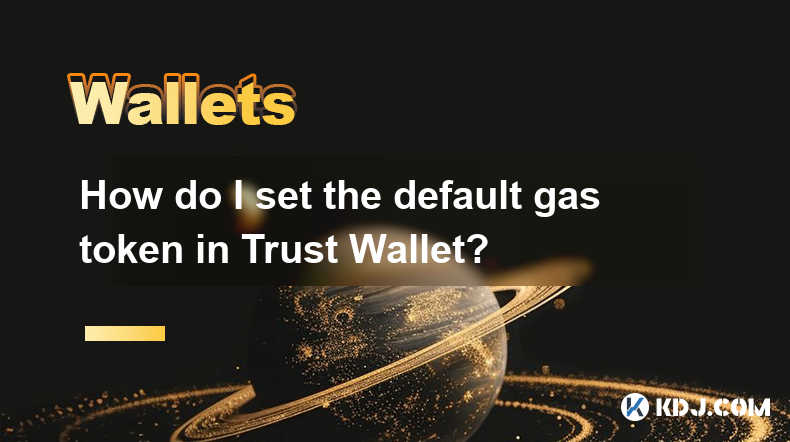
Trust Wallet doesn't offer a setting to directly choose a "default" gas token in the same way some other wallets might. The selection of the gas token is inherently tied to the specific network and the transaction you're initiating. This means the choice of gas token is context-dependent and not a globally applied setting within the wallet.
Understanding Gas Tokens and Their Role
Gas tokens are essentially the fuel that powers transactions on various blockchain networks. Different networks use different tokens. For example, Ethereum uses ETH, while Binance Smart Chain uses BNB. These tokens are required to pay for the computational resources needed to process and validate your transaction. The amount of gas required varies depending on the complexity of the transaction.
The crucial point is that Trust Wallet doesn't pre-select a gas token. Instead, it presents the relevant options during the transaction process itself. You will always be prompted to select the appropriate gas token based on the network your transaction is targeting.
Navigating the Gas Token Selection Process in Trust Wallet
When you initiate a transaction (e.g., sending tokens, interacting with a decentralized application (DApp)), Trust Wallet will guide you through the process. This process will always involve selecting the correct network and, consequently, the correct gas token.
Identify the Network: First, ensure you've selected the correct network (e.g., Ethereum Mainnet, Binance Smart Chain, Polygon) within the DApp or the sending/receiving interface. This is crucial because selecting the wrong network will result in transaction failure.
Review the Gas Fee: Before confirming, carefully review the gas fee displayed. This fee is expressed in the native gas token of the selected network.
Confirm the Transaction: Once you've confirmed the network and reviewed the gas fee, you can proceed with confirming the transaction. The wallet will automatically use the gas token associated with the chosen network. There's no separate "default" setting to change.
Why Trust Wallet Doesn't Have a "Default Gas Token" Setting
The absence of a global "default gas token" setting in Trust Wallet is a deliberate design choice. It's designed to prevent accidental usage of the wrong gas token, which could lead to failed transactions and loss of funds. By requiring you to select the gas token during each transaction, Trust Wallet enhances security and clarity. It forces you to be mindful of the network you're using and the associated costs.
This approach also accommodates the diverse range of blockchain networks supported by Trust Wallet. Each network has its own native token, and a single "default" would be impractical and potentially risky.
Managing Different Networks and Gas Tokens
Trust Wallet efficiently handles multiple blockchain networks. You can add and manage various networks within the wallet's settings. When adding a new network, make sure you have the correct network details. This includes the RPC URL, chain ID, and currency symbol. Incorrect details will prevent the network from functioning correctly.
Remember that each network has its specific gas token. Therefore, when interacting with a specific network, you will only see the relevant gas token presented as an option during the transaction confirmation stage.
Troubleshooting Gas Token Issues
If you encounter issues with gas tokens, such as high gas fees or transaction failures, consider these points:
Network Congestion: High gas fees are often caused by network congestion. Consider waiting for a period of lower network activity before retrying your transaction.
Incorrect Network Selection: Double-check that you have selected the correct network for your transaction. A mismatch between the network and the gas token will invariably lead to failure.
Insufficient Funds: Ensure you have sufficient funds in the appropriate gas token to cover the transaction fees. Insufficient funds will prevent the transaction from being processed.
Wallet Issues: Rarely, problems might stem from the wallet itself. Try restarting the app or checking for updates.
Frequently Asked Questions
Q: What happens if I select the wrong gas token?
A: Selecting the wrong gas token will likely result in a failed transaction. Your funds will typically remain safe, but the transaction won't be processed, and you'll lose the gas fee you paid.
Q: Can I change the gas fee amount?
A: You usually can't directly change the gas fee amount itself. However, you might be able to adjust the gas price (the cost per unit of gas) in some advanced settings within the DApp or transaction interface. This is often not available for standard token transfers.
Q: Why are gas fees so high sometimes?
A: High gas fees are typically due to network congestion. When many transactions are being processed simultaneously, the demand for network resources increases, driving up the price of gas. The price fluctuates based on network demand.
Q: Are there any alternative wallets with different gas token handling?
A: Yes, other wallets might have slightly different approaches to gas token management, but the underlying principle remains the same: you will need to select the appropriate gas token for each transaction based on the network being used. The specifics vary between wallets.
Q: What if I don't have enough gas tokens?
A: If you don't have enough gas tokens to cover the transaction fee, the transaction will fail. You will need to acquire more of the necessary gas token before attempting the transaction again. You can usually purchase these tokens on various cryptocurrency exchanges.
Disclaimer:info@kdj.com
The information provided is not trading advice. kdj.com does not assume any responsibility for any investments made based on the information provided in this article. Cryptocurrencies are highly volatile and it is highly recommended that you invest with caution after thorough research!
If you believe that the content used on this website infringes your copyright, please contact us immediately (info@kdj.com) and we will delete it promptly.
- CFTC withdraws internal administrative guidance related to the digital asset derivatives market
- 2025-03-30 16:10:12
- IntelMarkets (INTL) Could Leave ADA and XRP Price in the Dust as It Gives Early Buyers 911% Return
- 2025-03-30 16:10:12
- The XRP Community Is Witnessing a Breakout Moment as Investor Enthusiasm for the $XPL Token
- 2025-03-30 16:05:12
- title: Bitcoin (BTC) Could Witness a Death Cross “in about one to two weeks”
- 2025-03-30 16:05:12
- BTFD Coin (BTC) - The Meme Coin Market is Buzzing, and This Protocol Promises Explosive ROI
- 2025-03-30 16:00:12
- Veteran market analyst Peter Brandt has spotted a troubling pattern in XRP's price chart—a head and shoulders top.
- 2025-03-30 16:00:12
Related knowledge

How to easily generate a Bitcoin payment address
Mar 29,2025 at 10:49am
Generating a Bitcoin payment address might seem daunting, but it's actually quite straightforward. This process is crucial for receiving Bitcoin, as each transaction requires a unique address. Understanding how this works is fundamental to using Bitcoin effectively. This guide will walk you through the simple steps, regardless of your technical experti...
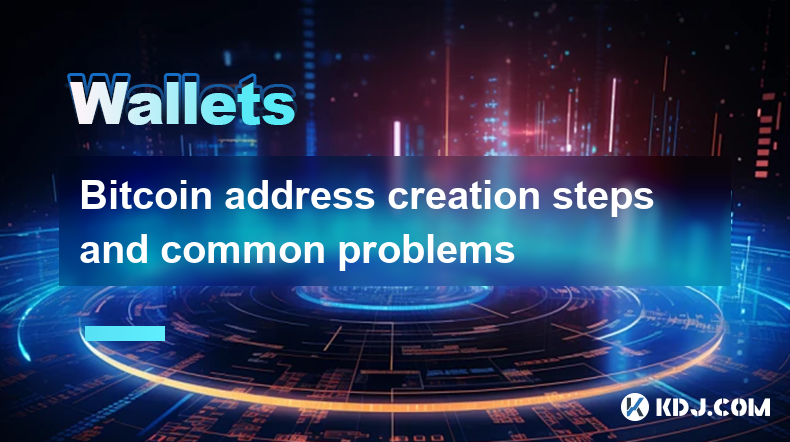
Bitcoin address creation steps and common problems
Mar 30,2025 at 06:07am
Understanding Bitcoin AddressesA Bitcoin address is a unique identifier, similar to a bank account number, used to receive Bitcoin. It's a string of alphanumeric characters generated from a public key, derived from your private key. Understanding the distinction between public and private keys is crucial for Bitcoin security. Your private key should be...
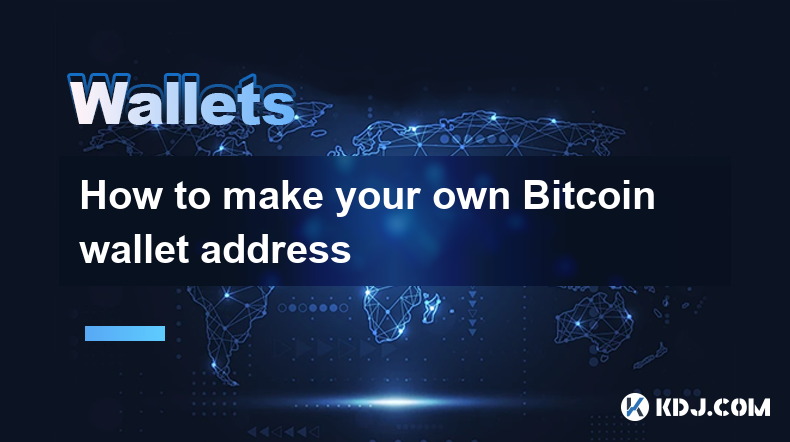
How to make your own Bitcoin wallet address
Mar 29,2025 at 08:42pm
Creating your own Bitcoin wallet address is crucial for securing and managing your Bitcoin holdings. It allows you to independently receive and send Bitcoin without relying on third-party services. This process involves understanding the different types of wallets and choosing the one that best suits your needs and technical expertise. Incorrectly gene...
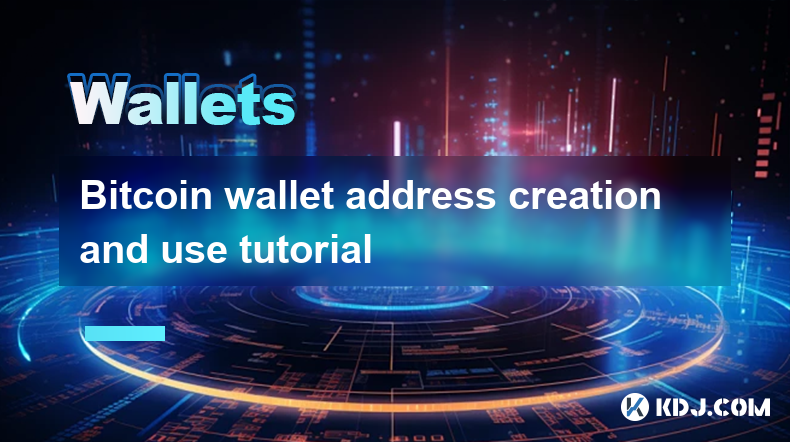
Bitcoin wallet address creation and use tutorial
Mar 29,2025 at 10:14pm
Understanding Bitcoin Wallet AddressesA Bitcoin wallet doesn't store Bitcoin in the way a traditional bank account does. Instead, it stores private keys, which are cryptographic secrets allowing you to access and spend your Bitcoin. Your Bitcoin address, on the other hand, is a public identifier, like an email address, that others can use to send you B...

Bitcoin address generation and secure storage guide
Mar 30,2025 at 08:07am
Understanding Bitcoin AddressesA Bitcoin address is essentially your public key, a string of alphanumeric characters used to receive Bitcoin. It's analogous to your bank account number. Unlike your private key, which is crucial for spending your Bitcoin, your address can be shared publicly without compromising your funds. Generating a new address is sim...
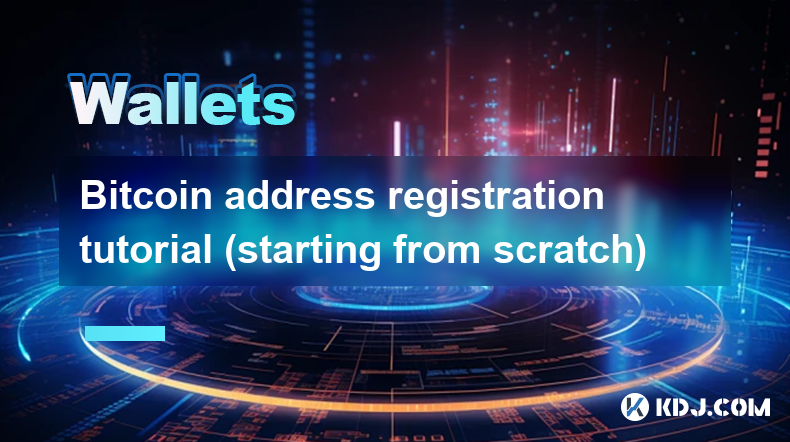
Bitcoin address registration tutorial (starting from scratch)
Mar 30,2025 at 10:21am
Understanding Bitcoin AddressesBefore diving into the registration process, it's crucial to understand what a Bitcoin address is. It's essentially a unique identifier, like an email address, used to receive Bitcoin. Unlike bank accounts, you don't 'register' a Bitcoin address in the traditional sense. Instead, you generate it using a Bitcoin wallet. Th...

How to easily generate a Bitcoin payment address
Mar 29,2025 at 10:49am
Generating a Bitcoin payment address might seem daunting, but it's actually quite straightforward. This process is crucial for receiving Bitcoin, as each transaction requires a unique address. Understanding how this works is fundamental to using Bitcoin effectively. This guide will walk you through the simple steps, regardless of your technical experti...

Bitcoin address creation steps and common problems
Mar 30,2025 at 06:07am
Understanding Bitcoin AddressesA Bitcoin address is a unique identifier, similar to a bank account number, used to receive Bitcoin. It's a string of alphanumeric characters generated from a public key, derived from your private key. Understanding the distinction between public and private keys is crucial for Bitcoin security. Your private key should be...

How to make your own Bitcoin wallet address
Mar 29,2025 at 08:42pm
Creating your own Bitcoin wallet address is crucial for securing and managing your Bitcoin holdings. It allows you to independently receive and send Bitcoin without relying on third-party services. This process involves understanding the different types of wallets and choosing the one that best suits your needs and technical expertise. Incorrectly gene...

Bitcoin wallet address creation and use tutorial
Mar 29,2025 at 10:14pm
Understanding Bitcoin Wallet AddressesA Bitcoin wallet doesn't store Bitcoin in the way a traditional bank account does. Instead, it stores private keys, which are cryptographic secrets allowing you to access and spend your Bitcoin. Your Bitcoin address, on the other hand, is a public identifier, like an email address, that others can use to send you B...

Bitcoin address generation and secure storage guide
Mar 30,2025 at 08:07am
Understanding Bitcoin AddressesA Bitcoin address is essentially your public key, a string of alphanumeric characters used to receive Bitcoin. It's analogous to your bank account number. Unlike your private key, which is crucial for spending your Bitcoin, your address can be shared publicly without compromising your funds. Generating a new address is sim...

Bitcoin address registration tutorial (starting from scratch)
Mar 30,2025 at 10:21am
Understanding Bitcoin AddressesBefore diving into the registration process, it's crucial to understand what a Bitcoin address is. It's essentially a unique identifier, like an email address, used to receive Bitcoin. Unlike bank accounts, you don't 'register' a Bitcoin address in the traditional sense. Instead, you generate it using a Bitcoin wallet. Th...
See all articles





















































































